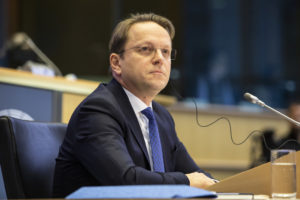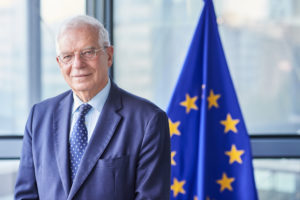The European Commission welcomes the endorsement by the European Parliament and the Council this week of the political agreement on the Neighbourhood, Development and International Cooperation Instrument (NDICI) – ‘Global Europe’ for the next MFF period (2021-2027). This instrument will support the EU’s external action with an overall budget of €79.5 billion in current prices.
The High Representative/Vice-President, Josep Borrell,
said: “Our new comprehensive instrument underpins the EU’s external action and enables us to be a leading global player and a reliable partner in the international scene, supporting our multilateral agenda. It gives us the flexibility needed to respond faster and in a more coherent way to ongoing and emerging global challenges, while supporting global priorities such as peace and stability, good governance, trade and inclusive and sustainable growth. This is what the world is expecting from the EU and we deliver.”

As lead negotiator for the European Commission, Commissioner for International Partnerships, Jutta Urpilainen,
declared: “This will be our most powerful tool to support a sustainable global recovery and promote comprehensive partnerships across the world that invest in democracy and human rights. With the instrument’s financial arm- the EFSD+- we will have the means to increase the mobilisation of private investments towards the achievement of the Sustainable Development Goals. For our geopolitical Commission, this instrument will consolidate a stronger Europe in the world, by aligning better our funding to our overall priorities. We will strive for at least 20% of the overall funding in human development and increase the funding from 7% to 10% in education for the countries under my responsibility.”

Commissioner for Neighbourhood and Enlargement, Olivér Várhelyi,
noted: “The new EU’s external action financial instrument will help us implement our renewed partnership with Southern Neighbourhood and kick-start the economic recovery of our neighbours in the East by boosting growth and jobs and support key sectors like connectivity, infrastructure, energy and digital. Together we will increase the resilience of our partners’ societies and economies and turn challenges into opportunities, including green and digital transformation. We will also invest in human development and opportunities for the youth, in mutual interest.”
With an overall allocation of €79.5 billion in current prices, the new instrument will cover the EU cooperation with all third countries. The total allocation will be divided as follows:
€60.38 billion for geographic programmes (at least €19.32 billion for the Neighbourhood, at least €29.18 billion for Sub-Saharan Africa, €8.48 billion for Asia and the Pacific, and for Americas and the Caribbean €3.39 billion);
€6.36 billion for thematic programmes (Human Rights and Democracy, Civil Society Organisations, Peace, Stability and Peace Conflict Prevention and Global Challenges);
€3.18 billion for rapid response actions.
A “cushion” of unallocated funds of €9.53 billion could top-up any of the above-mentioned programmes and rapid response mechanism, to address unforeseen circumstances, new needs or emerging challenges and promote new priorities. The new instrument will particularly support countries most in need to overcome the long-term developmental challenges and will contribute to achieving the international commitments and objectives that the Union has agreed to, in particular the Sustainable Development Goals, the 2030 Agenda and the Paris Agreement. It merges several current external financing instruments under the EU budget.
Background
NDICI – ‘Global Europe’ incorporates the cooperation with Africa, the Caribbean and the Pacific into the budget, which has been financed for decades by the European Development Fund. This Fund was directly financed by the EU Member States, not by the EU budget, and therefore was not subject to the scrutiny of the European Parliament. Through NDICI – ‘Global Europe’, the EU will also boost its support to sustainable investment worldwide under the European Fund for Sustainable Development Plus (EFSD+) by leveraging private capital to complement direct external cooperation grants. The EFSD+ will be backed by a €53.4 billion External Action Guarantee, which will also cover the Western Balkans.
The political agreement reached on the new instrument in December addressed the last most sensitive open elements of the negotiations, concerning mainly the indicative allocation for some regions and thematic areas, migration, the governance of the new instrument, and the spending targets for issues such as climate change, which will increase to 30%. The political agreement has been translated into the legal text, endorsed this week by the European Parliament and the Council.
Next steps
The new instrument is expected to enter into force in the coming months, after its formal adoption by the Council and the Parliament. Once adopted, Global Europe will be implemented through the adoption in 2021 of multi-annual indicative programmes for the 2021-2027 period for each region, partner country and thematic programme, to be prepared by the services of the Commission and the European External Action Service, which will frame the subsequent financial implementation of actions.
The EU’s long-term budget, coupled with NextGenerationEU, the temporary instrument designed to boost Europe’s recovery, will be the largest stimulus package ever financed through the EU budget. A total of €1.8 trillion (in 2018 prices) will help rebuild a post-COVID-19 Europe. It will be a greener, more digital and more resilient Europe.
The last step of the adoption of the next long-term EU budget was reached on 17 December 2020. The European Commission has started committing the funds under the new EU long-term budget as of 1 January 2021.
For the Commission to start borrowing under NextGenerationEU, thus making the instrument operational, the ratification of the new Own Resources Decision by all Member States in line with their constitutional requirements is still needed.


















